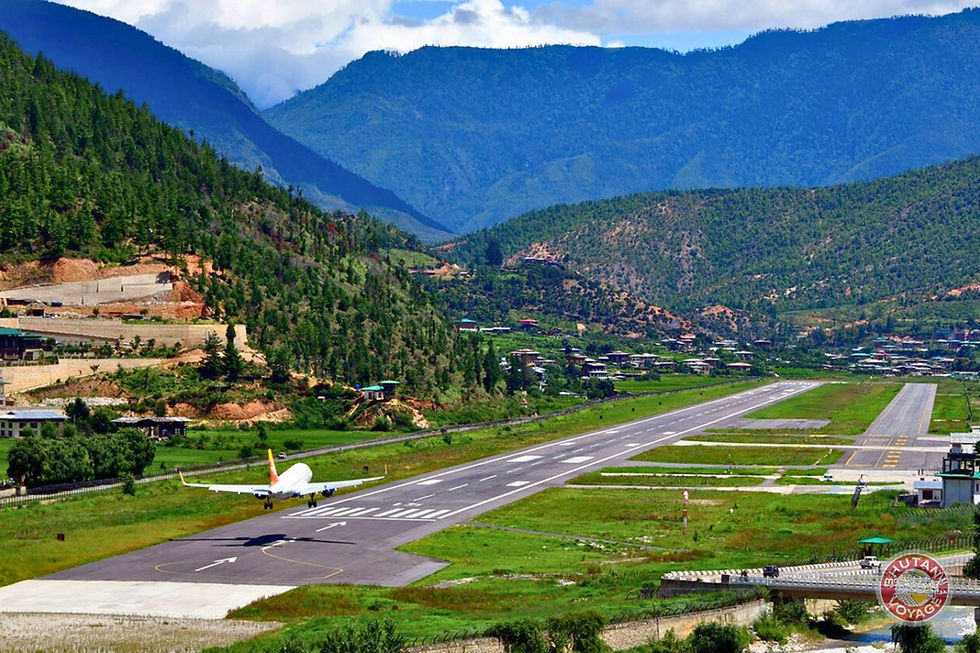Everything You Need to Know Before Traveling to Bhutan | Things to Know Before Bhutan Travel
- Chundu Rigden

- Aug 19, 2025
- 3 min read
Updated: Oct 10, 2025
Bhutan, known as the Land of the Thunder Dragon, is one of the world’s most enchanting yet mysterious travel destinations. With its pristine landscapes, deeply rooted traditions, and philosophy of Gross National Happiness, Bhutan offers an experience unlike any other. However, because of the country’s unique tourism policies, planning a trip requires careful preparation. This guide covers everything you need to know before traveling to Bhutan so you feel confident, prepared, and excited for the journey.
Visa and Travel Entry Requirements
Unlike many countries where travelers can simply book flights and go, Bhutan requires all foreign tourists (except citizens of India, Bangladesh, and the Maldives) to obtain a visa prior to arrival. The process is straightforward but must be arranged through a licensed Bhutanese travel agency, such as Bhutan Voyage.
Once your trip is confirmed, your agent will process the visa on your behalf. You’ll receive an approval letter before departure, and the actual visa will be stamped into your passport upon arrival. This ensures a smooth and stress-free entry into the kingdom.
The Sustainable Development Fee
Bhutan follows a unique “high value, low impact” tourism model, designed to preserve its environment and culture. As of 2024, tourists pay a Sustainable Development Fee (SDF) of $100 per day.
This fee directly contributes to environmental conservation, cultural preservation, healthcare, and education in Bhutan. While it may seem unusual, many travelers appreciate knowing their visit actively supports the country and its people. When you travel with Bhutan Voyage, this fee is already factored into your package price, so there are no hidden surprises.
Know When to Visit Bhutan
Bhutan is a year-round destination, but the experience differs depending on the season:
Spring (March–May): Blooming rhododendrons and mild weather make this a popular time for trekking and sightseeing.
Summer (June–August): The monsoon brings lush greenery and fewer tourists, though rainfall can be heavy.
Autumn (September–November): Clear skies, comfortable temperatures, and vibrant festivals make autumn the peak travel season.
Winter (December–February): Crisp air, snow in higher regions, and fewer crowds create a serene atmosphere.
Your choice depends on whether you prefer colorful festivals, quiet retreats, or adventurous treks.
What to Pack | Things to know before Bhutan travel
Packing for Bhutan requires consideration of the varied climate and cultural etiquette. Essentials include:
Comfortable walking shoes for exploring monasteries and dzongs
Layers of clothing to adapt to changing temperatures
Modest attire (shoulders and knees covered) when visiting religious sites
A light rain jacket if traveling during monsoon months
Sunscreen and sunglasses for high-altitude sun protection
A reusable water bottle to support Bhutan’s eco-friendly practices
Travelers on trekking itineraries should also bring sturdy hiking boots and thermal wear for colder altitudes.
Etiquette and Culture
Bhutanese culture is rooted in Buddhism and traditional values, so respecting local customs is essential. Here are a few etiquette tips:
Always remove your shoes before entering temples and monasteries.
Avoid pointing at sacred objects or people.
Dress modestly, especially in religious and cultural sites.
Photography is restricted inside some temples—always ask before taking pictures.
A slight bow or placing your hands together in greeting (“Kuzu zangpo”) is appreciated.
Being mindful of these practices ensures a warm reception and a deeper cultural connection.
Food and Cuisine
Many travelers worry about Bhutanese food being too spicy. While traditional dishes like Ema Datshi (chili and cheese stew) pack a punch, Bhutan Voyage offers curated menus that balance authentic flavors with international favorites. Expect to enjoy both Bhutanese staples such as momos (dumplings) and buckwheat pancakes, along with milder fusion options for comfort.
Vegetarians will find plenty of options, and dietary preferences can be accommodated with advance notice.
Health and Safety
Things to know before Bhutan travel include understanding that Bhutan is considered one of the safest travel destinations in Asia. Crime is extremely low, and the locals are welcoming and hospitable. However, due to high altitudes, some visitors may experience mild altitude sickness. Staying hydrated, pacing yourself, and avoiding overexertion in the first days helps ease the adjustment.
It is also recommended to have travel insurance that covers medical emergencies. Bhutan has basic healthcare facilities, but for serious conditions, evacuation to India or Thailand may be necessary.
Travel with Confidence
Bhutan is unlike anywhere else in the world where nature, culture, and happiness come together seamlessly. With the right preparation, your journey will be comfortable, enriching, and truly unforgettable.
When you travel with Bhutan Voyage, every detail is handled: from your visa and transfers to curated experiences that blend Bhutan’s traditions with international comfort. All you have to do is arrive with an open heart and let the Land of the Thunder Dragon work its magic.





A clear and engaging guide that makes Bhutan travel feel simple and exciting. I love how it combines practical tips with cultural respect, especially the warm bhutanese greeting touch. Very helpful, inspiring, and perfect for first-time visitors to Bhutan.